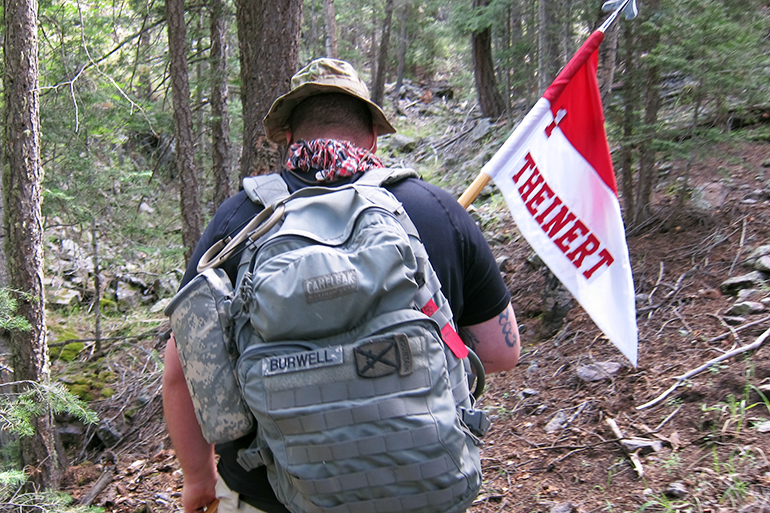East Enders Offer Veterans a Path to Healing at Strongpoint Theinert Ranch

In the nearly two decades of war since 9/11, it’s become increasingly rare to find a community in the United States untouched by combat losses in Iraq and Afghanistan, or the hard reality of veterans struggling to cope with the trauma of their experiences overseas. An average of 17 veterans lose that fight and commit suicide every single day, according a new calculation from the Department of Veterans Affairs (VA), but help is out there.
Right here on the East End, one Shelter Island family has turned the unimaginable tragedy of losing a son and brother into a mission of hope and healing for the warriors who do make it home. A New York Army National Guardsman assigned to 10th Mountain Division, 1st Lt. Joseph Theinert was killed by an IED on June 4, 2010 while on patrol near Kandahar, Afghanistan. He was just 24 years old.

Since February 2016, 1st Lt. Theinert’s mother Chrystyna Kestler, stepfather Dr. Francis “Doc” Kestler and younger brother Jimbo Theinert, along with about a dozen other volunteers, have opened their 1,000-plus-acre family ranch in the mountains of remote Magdalena, New Mexico as a retreat and bridge program for veterans and gold-star families to find a way forward. Called Strongpoint Theinert Ranch (STR), the program has already found great success helping to bring self-care, wellness and mindfulness to those who need it, while also keeping Joe Theinert’s memory and legacy alive.
Jimbo Theinert, a high school math teacher on Shelter Island who did not serve in the military, explains that being around veterans, other gold-star families and the military community helped him feel closer to Joe in the years following his death. “No single veteran will replace my brother and the relationship I had with him, but in the immediate, like a lot of our family, we just enjoyed being around, primarily, guys in Joe’s unit—people he served with who knew him in a different way than we did. It just made us feel good,” he recalls, pointing out that they began meeting members of various veterans’ organizations, and soon it became clear his family could heal through service.
At the same time, he, his mother and stepfather had all spent time individually at their family ranch, unplugging and coming to terms with their loss. “The property helped us to heal from the tragedy of losing Joe. That’s where the idea for Strongpoint came from,” Theinert says, describing the realization that hosting groups of veterans at the ranch could help others outside their immediate family. Soon, their program began to take shape.

“We’re completing our fourth year of work at Strongpoint Theinert Ranch, and in that time we’ve hosted 12 veterans programs,” he adds.
One of STR’s earliest participants (on their second retreat), Southampton resident and U.S. Marine Corps veteran Dan Kelly says he quickly saw value in the program. He’s since become a vital member of the team, helping facilitate programs for other veterans, fundraising and all aspects of keeping STR going.
“That community, that togetherness you get in the service is sort of recreated to some degree,” Kelly says of his experience in New Mexico. “You’re back with your comrades and even if you don’t know them, there’s an instant feeling of comfort. It’s easy to relax out there because you’re with likeminded people who have been through similar things, and you’re in this beautiful, quiet environment. The only thing you hear is the birds and the wind. It’s beautiful.”

While getting back to nature and disconnecting from the internet and cellphones is part of the experience, a typical five-day trip to STR includes a structured schedule of hands-on, interactive activities, such as hiking, group talk, readings, watching and discussing relevant films, a walking labyrinth, burying time capsules, and work projects that allow participants to give back and make their mark at the ranch by creating something that wasn’t there before they arrived.
“We’re introducing people to self-care techniques and strategies that are hopefully going to be helpful, but the work is not over. You need to go home and still practice those things. This is not a magic bullet or magic pill where [veterans will leave saying] ‘I went to New Mexico for five days and now I’m fine. I don’t have PTSD. I don’t have anxiety anymore.’ It’s a bridge program that hopefully leads people to those better places,” Theinert says, describing how all trips follow certain program essentials, but each can be shaped for groups and individual participants. “That’s the strength of being a small organization.”

Demonstrating this flexibility and their success starting vets down a road toward healing, both Theinert and Kelly recall their recent program comprising only veterans who experienced the devastating March 2018 crash of Jolly 51, an HH-60G Pave Hawk helicopter that went down in western Iraq, killing seven combat rescue Airmen—four of whom were based out of Francis S. Gabreski Air National Guard base in Westhampton.
“In February we had 10 people come out to the ranch from that unit and it was amazing. We were able to tailor our program specifically for them,” Kelly says. “It was the first time we dealt with a single event and dealt with it in varying degrees,” he continues. “We had people from Jolly 52 who saw the whole thing happen. We had intel people who watched it on drone. In a relatively short amount of time from an incident happening, within a year, we were able to get people from that unit out to the ranch and it was a very positive experience for all those involved. That, I think, shows the flexibility and the elasticity of Strongpoint Theinert Ranch.”

Further, Theinert adds, “We asked vets from the Jolly 51 group that came out, ‘When was the last time you got to talk about the incident like this?’ The answer was a resounding ‘never.’ We’ve been at war now for 18 years, going on 19 years—the longest war in our history—and there’s a good probability that people have never had a chance to talk about these terrible traumatic incidents. That’s what we’re trying to do.”
And for every soldier killed, there are dozens of military brothers and sisters and family members left to grapple with the loss, many of them having witnessed the horror firsthand.

“One of the trips in August was made up of guys from Joe [Theinert]’s unit. That unit had 18 casualties in Iraq and Afghanistan, and they’ve had 26 stateside deaths via suicide and car accident,” Kelly says, explaining the benefit of such focused programs. “That’s our target, we’re helping people deal with life-changing, traumatic events and we’re really good at it. It’s a unique thing,” he continues, noting that more of these focused retreats are in the works.
Unlike some programs dedicated only to post-9/11 vets, STR is open to veterans of all wars and costs them nothing. All it takes, as Theinert and Kelly explain, is a willingness to go, which is the first step toward healing. “We’re going to try to get right, and part of getting right is acknowledging that there’s some stuff that is wrong,” Kelly says, repeating words he might impart to fellow veterans at STR. “We’re out here, we committed the time to get out here, let’s get better.”

Families affected by the loss of loved ones in the military, or veterans who need help can apply to Strongpoint Theinert Ranch at strongpointtheinert.org, which also accepts donations and offers to volunteer. STR is less than $100,000 from completing their latest bunkhouse expansion, and a $600 donation will pay for one veteran to participate in the free program, including airfare.
Anyone interested in getting to know and supporting STR can also attend their final 1LT Joe Theinert Memorial Basketball Tournament on Saturday, November 30 at 1 p.m. in the Shelter Island School gymnasium (33 North Ferry Road).




